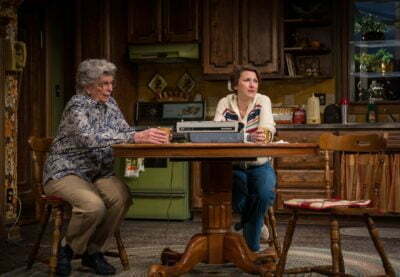Soups, Stews, and Casseroles: 1976

By Rebecca Gilman
Directed by Robert Falls
Produced by Goodman Theatre, Chicago
History Comes to Life with a False Ending
In case you haven’t noticed, the job market is tough. Already weakened by decades of Reaganomics, public-sector unions have taken another hit across the Midwest in recent years, and private-sector unions have declined since the nation’s bicentennial as well. Also, people are eating mass-produced, preservative-laden crap instead of local produce. Playwright Rebecca Gilman sees all these things as connected, and lays them out in her 2014 play Soups, Stews, and Casseroles: 1976. The show debuted in St. Louis two years ago, but is now being directed in Chicago for the first time by Goodman artistic director and Gilman’s long-time collaborator Bob Falls. Though there’s little in the play that’s revelatory, this examination of a working family in a small town under siege by a conglomerate does contain true-to-life nuance, until the playwright makes a false move in the final scene. Up until then, its reflection of vital economic issues to the rural Midwest commands the audience’s attention.

The story is set in in 1976 in the fictional town of Reynolds, Wisconsin, apparently located in the southwest corner of the state, and dependent on a dairy factory which buys from the local farmers. Kim (Cliff Chamberlain) has worked there since he was nineteen, and is now in his early thirties. His wife, Kat (Cora Vander Broek), writes the social register for the paper, and works with her elderly old-leftie friend, JoAnne (Ann Whitney, Meg Thalken at some performances) compiling donated recipes into a cookbook sold to raise charity money. They and their teenage daughter, Kelly (Lindsay Stock), were getting by, until the factory gets bought by a Chicago conglomerate with a reputation for busting unions and introducing automation. The family is nervous that Kim and most of the people they know could lose their jobs, but then, something curious happens. The unseen boss and his wife, Elaine (Angela Reed) take a liking to the family.

In truth, Kim had long thought that several of his co-workers were incompetent, and that automation would improve the factory. The reason it was sold in the first place is that it was losing money, and his years on the floor hadn’t made him feel like an appreciated member of a tight-knit community. And as much as he likes the union head, Kyle (Ty Olwin), the fact that a college-educated kid in his mid-twenties with hair like Jesus was elected leader without opposition is a sign of how useless the workers knew their union truly was even before the change in ownership. Meanwhile, Kat finds that Elaine shares her outsider status, as the town has long been dominated by a clique of Swiss families who sneered down at the German and Swedish proles, and Kat doesn’t entirely mind seeing the provincial power system shaken. Elaine’s belief in self-help, not to mention her knowledge of current fashion and willingness to call out Midwestern false-niceness, makes her an admirable contrast with the rest of the town. Kim and Kat can’t quite bring themselves to feel all that bad about being spared the troubles of their neighbors. JoAnne and Kyle can call them sell-outs, but their dogma has already failed, and the supposed evils of the conglomerate remain hypothetical.

Obviously, the story is about temptation, and Gilman clearly presents part of the reason why she thinks working-class people vote against their own interests. Though most of the characters are in some way archetypical, each of the actors makes their role into a complete person. Kim and Elaine are underappreciated for how smart they are, and each blames themselves for having been too kind in the past. Kim had a chance to inherit the family farm, but let it pass to a brother who never repaid him, and Chamberlain’s performance captures not only his bitterness, but also his wistfulness, and natural inclination to be a decision-maker. Elaine’s backstory is less detailed, but she preaches self-help with the zeal of a convert, resents being shuttled around as a trophy-wife, and is attracted to Kim’s determination not to be taken advantage of again. Vander Broek’s Kat is less frustrated with her family, but also knows she’s too passive, and regards her pre-conglomerate work as a soul-crushing slog. Olwin’s Kyle is devoted to his cause, but one gets the sense that, knowing he can just walk away from the town after his disabled father dies, he doesn’t mind burning himself out. And Stock’s Kelly expresses generalized concern about Reynolds, but her concern for social justice is always elsewhere, and she clearly wasn’t raised to even consider a future in Reynolds.

Falls is very much on Gilman’s wavelength, and his cast finds the appropriate humor in each of the show’s satirical and slice-of-life moments. They have the sometimes-combative, but ultimately loving dynamic of an extended family that depends on each other, but could use more space. Scenic designer Kevin Depinet has provided them with an appallingly hideous house, which is truly remarkable for how ugly every single object in it is—they really do need Elaine’s help. The script is a little too long, but its biggest problem is its ending, in which a character does something that totally contradicts everything about how they’ve been set up, and which isn’t believable in light of real history. Though there are still specialty cheese stores in the region Gilman depicts, today, one can pass through many small towns in southwest Wisconsin and northwest Illinois in which nearly all the businesses seem to just be unprofitable stores elderly people run to amuse themselves. The play was written in 2014 and therefore could hardly address the place of unions in Illinois’s current fiscal mess, but a discussion about anti-union backlash in the Great Lakes states really isn’t complete without addressing rural peoples’ feeling that they are treated as tribute-paying provinces for distant city machines, which isn’t even mentioned in Soups, Stews, and Casseroles. Still, the play is a fresh telling of an old topic near and dear to most people’s hearts, and contains some great performances.
Recommended
Jacob Davis
Playing in the Owen Theatre at the Goodman, 170 N Dearborn, Chicago. Tickets are $10-40; to order, call 312-443-3800 or visit GoodmanTheatre.org. Performances are through June 19. Running time is two hours and fifteen minutes with one intermission.

